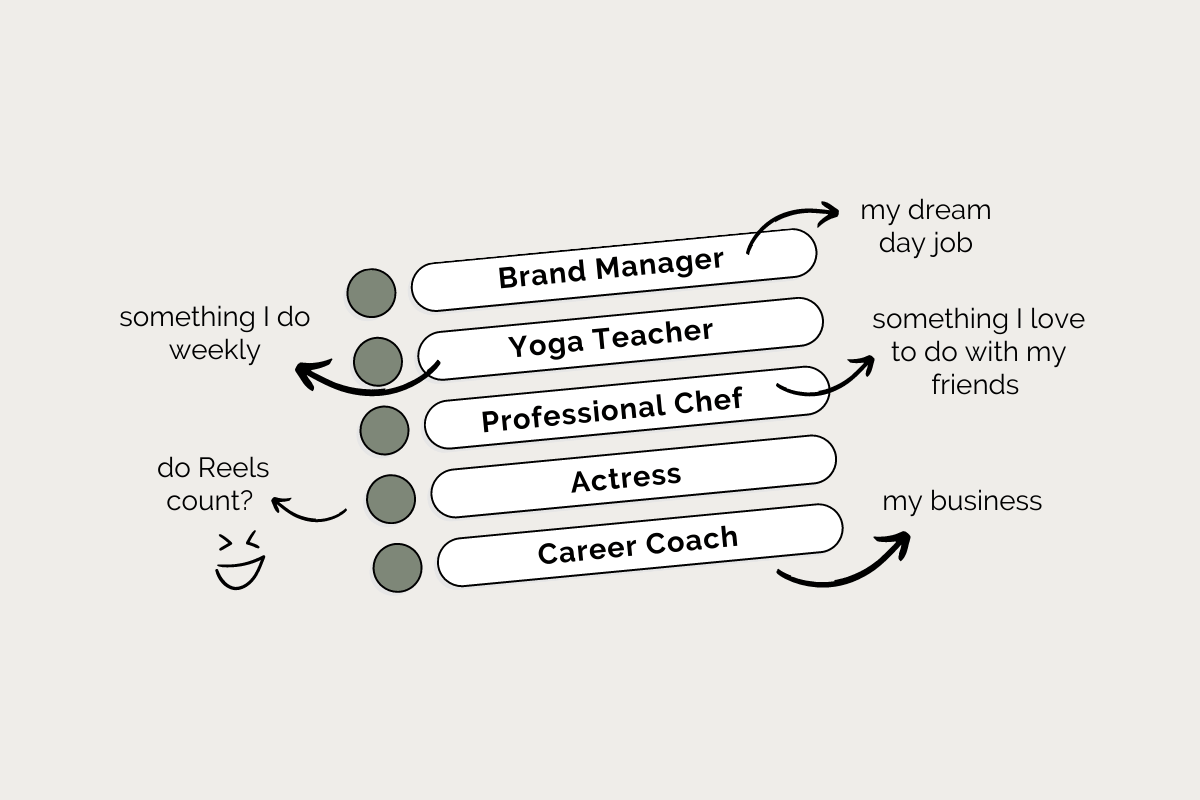
Introvert-friendly way of gaining killer career clarity
Let’s be honest: As introverts we tend know exactly what we want and what we don’t want. But over time, we get so good at silencing the big dreams and visions that it’s sometimes hard to see – or remember – them. The first thing I want you to understand about career clarity is that it is not about achieving our every career dream. It’s about having a dream in the first place.
Where do you see yourself?
This is one of the most dreaded questions in any interview process or career conversation. The part where they ask you “where you see yourself in five years”. The reason why this question is heavy to most career professionals is twofold:
One, because we don’t really believe in the concept of planning out the next five years. Too often, life has taught us that what we’ve been planning is not what it has in store for us.
Two, because we fear that whatever we might say is not what our counterpart wants to hear. Does it seem overly ambitious to present bold career dreams? Are we being perceived as too slow when our goals are ambitious enough? We fear that we can’t get it right. So, we’d rather not come up with a plan in the first place.
Why is career clarity important?
Here’s the thing about career clarity: It’s about direction, not destination.
Gaining career clarity is not about creating a detailed plan that will be redundant five years down the line. It’s about understanding the direction in which you want to go in your career.
Think about all the times you find yourself at a crossroads, a block in the road or simply an open door or opportunity that you hadn’t previously considered. In these moments, career clarity provides you with a clear compass that helps navigate decisions as quickly as they need to be made.
Knowing the overall direction you want to take in your career enables you to assess whether an opportunity is going to bring you closer, or not. In an instant.
The second reason why career clarity is important, is that it helps others help you. Picture your boss, or your boss’s boss with their busy schedules and vast group of stakeholders they need to manage on a daily basis. More often than not, they do not have the time to help you “figure out” what you want to do next, or where you intend to take your career.
But providing them with that exact clarity allows them to easily help and support you despite their busy schedules. Let’s say you tell your Manager or n+1 you are keen to become a senior leader in your function in the medium term. They can then take this information and share it with their internal contacts. They might be able to give you advice on how to develop & grow in this field, they might even be able to tailor your tasks and projects to that particular ambition.
Oftentimes, corporate managers are being asked what their employees aspire to for internal talent management purposes. Enabling them to present a clear answer in that instant puts you on the map with key decision makers and enablers in the organization.
So, whenever you are being asked “where you’re headed” in your career, I want you to be ready and use the opportunity to your advantage.
How to gain career clarity in the first place
Now, this all seems fair, but how do you go about gaining that clarity in the first place?
I’m going to share with you five introvert-friendly tips to help you gain killer clarity in your own peace and quiet and are ready whenever you’re being asked “what’s next”.
Grab pen and paper, and let’s dive in:
1 Reflection
Before you skip the “boring” reflection part, hear me out. The following two questions are about as powerful as it gets for career clarity these days. And still, they come with two big hurdles: (1) Taking the time to truly answer them for your unique career journey; (2) Having the courage to act on the clarity and bring these changes into your career.
Here they come.
Question #1: What kind of problems do I enjoy solving?
This one is different to the usual question of “what do you enjoy doing?” Here’s the thing: What you enjoy to do in your free time is not necessarily something you’d enjoy as a profession. More often than not, we uncover that the perception we have of a certain job or position differs dramatically from what it feels like to do that job on a day to day basis.
So, this question allows you to project yourself into the career you’re thinking about. It gets you to thinking what the kind of problems are that you’d be dealing with, if you were to claim a spot in your desired field. What are the problems you would actually enjoy solving? Once you go down that path of self-reflection, you almost can’t go wrong anymore.
Question #2: What kind of people do I love working with?
You heard this before: You are the average of the people you surround yourself with on a daily basis. Which makes this reflection a non-negotiable. Have a think about the kind of environment and the kind of people that help you thrive.
When are you at your best? When do you feel truly in tune with yourself? And then try to remember what kind of environment, which kind of people have brought this on and enabled you to feel at your best in the past? This is what you should be chasing and going after in the future.
2 Play Time
Play is deeply connected with what we like to do at our core. Let’s have a closer look at what you love to play. Chances are, you might find a clue that hints at an interest or passion you have been neglecting all along. I used to love games that were about building a world of your own, such as THE SIMS. Today I am deeply passionate about brand building and future thinking.
3 What sparks joy?
Ever got goose bumps when someone presented about a topic that felt close to your heart and passion? That’s when you want to take a mental note about what aspects of the topic made you come to live and sparked joy.
Think about: What kind of topics spark joy for you? Which activities at work put you in a flow, where you almost lose track of time and it doesn’t feel like work at all? When do you get goose bumps? Which topics feel warm?

4 Dare to dream
Remember the career you had envisioned as a five-year-old? That crazy idea you had at the age of 19? This is the right time to dust these dreams off and check whether they might still be relevant. For a few moments, shake off the limiting beliefs and make a list of careers or jobs you consider your dream professions.
They don’t have to complement each other – they don’t even have to fit in a lifetime. But be sure to capture your honest and deepest longings.
You’ll see, bringing a dream to life doesn’t always mean it has to become your day job. Interestingly enough, the ideas we have about certain professions wouldn’t end up fulfilling us at all. But there are certain aspects of each of these dreams that can come to life in ways we hadn’t imagined before.
Some might end up becoming a side hustle, a project for the weekend, a hobby, or even a topic we blog about and become experts in.

That way, all your career dreams are being heard. And you’ll find that nothing is impossible.
5 Visualize
This is the one I get most excited about when working with my clients. And I’m going to tell you why. I know you might think creating a vision board is a little “woo woo” and doesn’t really work in real life.
But here’s the thing: A vision board is not a “wish list” that we send out into the universe, hoping things will come to fruition while we wait and do nothing.
A vision board is a daily reminder & inspiration. It plays back to us what truly motivates us on the days that feel heavy and our dreams far out of reach. It burns itself into our subconscious and effects our decision making and action taking in ways we don’t even recognize.
Crafting a vision board that works comes down to two things:
1. Asking the right questions
Don’t just think about the kind of job you want. Think about the kind of day your dream job or career would enable you to have. When do you wake up? How do you get to work? What does your work place look like? What kind of people do you work with? What elements of your daily business brings out the best in you? What helps you thrive and come to life?
2. Finding the right images
Spend some time on your favorite platforms or magazines and be sure to find the right images that support your vision. Now, here’s what’s important: Be bold enough when you select these images. You don’t have to share this vision board with anyone. So, don’t run these through a filter of “what would people say if they saw this”. This is your own personal vision and space and it should drive excitement with a dash of “almost too good to be true”.

Take your career clarity further
I know it’s one thing to reflect on these questions and thought starters in your own peace and quiet. But I know very well that you get to a whole different level when you run these thoughts and outputs by someone who sees the next steps ahead and can maneuver them into meaningful actions.
That’s why career clarity is a key element in my signature coaching program, the Quiet Move Accelerator. It helps drive killer clarity of the direction my clients want to take in their career and allows them to really start believing they have the power to bring it to life.
If you’re serious about taking control of your career and gaining killer clarity to unlock your full potential, have a look at the program here.
You might also like…
How introverts become dream candidates with personal branding
The #1 mindset shift you need to make if you want to attract job opportunities in line with your personality and skills. I recently had an...
How introverts win in corporate
According to a study by The Hustle, leaders and executives in the corporate world are predominantly extrovert. And with them, the advice we get on...

Hi there, I'm Hannah!
I’m an ambitious introvert, Brand Marketer and Career Coach who turned her quiet power into an introvert-friendly online business. I balance my busy work day with yoga, loads of coffee and long dog walks. My mission is to help fellow introverts uncover their inherent power and claim the spots they deserve.


